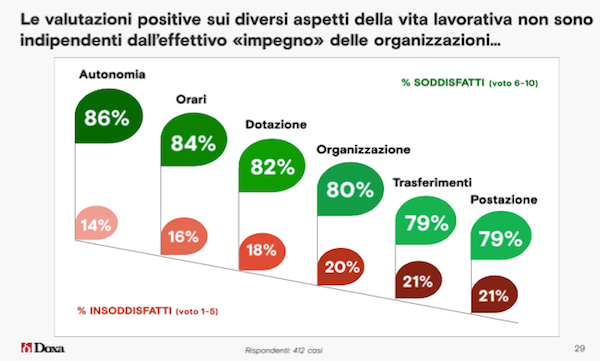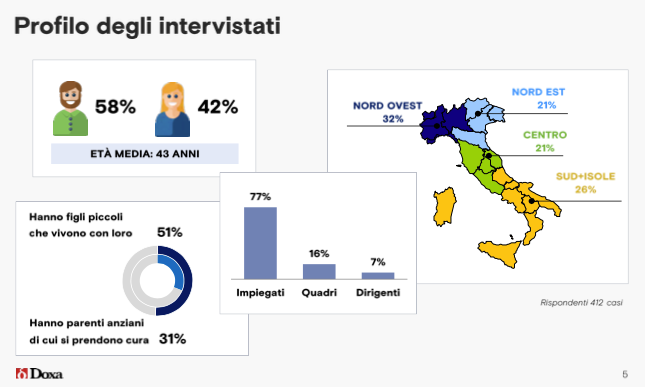
How does Smart Working affect people’s well-being? What’s the Italian workers’ level of satisfaction with respect to their current working condition and what is their attitude towards smart working?
The data coming from the survey “Smart & Well”, on 400 white collars, are conflicting with our optimistic certainties but we have some useful information for those organizations intending to implement or continue their approach to more flexible ways of working.
The survey carried out in Italy by Doxa and Trivioquadrivio clearly points out two things.
The first thing, it confirms that smart working is most of all a cultural change: those in charge can succeed only if they are themselves supporters of this change.
The second thing is a sign that a change management is taking place: companies are increasingly concerned about the well-being of their employees and the demands of family and work: 9 companies out of 10 provide for systems of corporate welfare inside or outside the company: on the one hand, policies targeted to a more flexible work, on the other hand, steps oriented to a work-life balance. That’s what the interviewees said.
The workers interviewed are on average satisfied as far as Flexibility of workplaces and Flexibility of working hours are concerned, with some misgiving for a possible burnout.
On the theme Autonomy at work and work by objectives, the attitude is sometimes ambivalent.
Improve the interior design!
55% of people work in open plan offices and although appreciating the advantages of sharing, they complain about the lack of privacy and concentration.
Teamwork accounts for 31% only, while 54% of them work alone.
20% of workers is not satisfied with their workstation in terms of comfort and functionality, which shows that there is still much room for improvement in office design.
Aptitude segmentation: surprise!
On the basis of agree and disagree attitudes towards smart working, people interviewed were subdivided into four groups:
Convinced (19%)
In favor (21%)
Doubtful (47%)
Resistant (13%)
Identikit.
Contrary to what you may expect, the most Resistant are mainly women over 55 from central-southern Italy, with a management position in small and medium-sized enterprises, who don’t wish to give up their routine and hard-won privileges.
The Doubtful include 34/45 year-old men, holders of a diploma yet Undergraduates, working in medium-sized firms, who complain about the company’s bureaucratic organization but don’t want more responsibility.
On the contrary, the most In favor are 35/45-year old women; no children, working in small companies in northern Italy, they feel stressed because of time spent in home-to-work journeys and, most of all, they want to have more training opportunities, more autonomy and responsibility.
The Convinced are men from northern and central Italy, 35/44 , with degree and master’s degree, who hold positions of responsibility in multinationals, hence used to work in companies culturally more advanced.
What about the Millennials and the Z Generation?
Now we need to find out the attitude of younger generations, since they were not included in the survey.
Report by Renata Sias


















